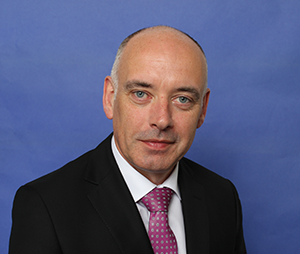Turning data into patient value

Understanding precisely what is responsible for good health outcomes is just one of the benefits to be gained from better data collection and analysis in our health service. KPMG’s head of healthcare, Frank O’Donnell talks to Barry McCall.
In 2016, Ireland is facing a growing and ageing population and, with continued pressure on the public purse strings, our healthcare system and the challenges of managing all the data it produces remain ever present.
Frank O’Donnell believes that the health service is a mine of valuable data which can be used to support better decision making and deliver a better quality of care to patients. The challenge is collecting and assessing the data in what is a necessarily complex system.
“The challenge with anything around healthcare is that the whole area is so complicated and complex,” he says. “This is because of the human dimension. There is a natural element of unpredictability due to this. Data is collected in various forms throughout the health sector and there exists significant potential to collect, use and share it in ways that help senior decision makers in the sector to make better decisions and achieve greater efficiencies.”
According to O’Donnell, this applies to all levels of the system. “At the most important level, it gives the clinician better data about the patient to allow better decisions and that has to be good. When you move upwards in an organisation, that data can be used for management decisions such as rostering staff in order to meet demand patterns and make better use of health funding.”
Population health
A broader view of data allows us to consider population health. This necessitates a shift in thinking around the very definition of healthcare and takes into account various social, economic, physical and environmental factors that affect health. The health of a population is measured by health status indicators and is influenced by social, economic and physical environments, and personal health practices and lifestyles. It focuses on the conditions and factors that influence the health of populations, identifies variations in their patterns of occurrence, and uses the resulting knowledge to develop and implement policies and actions to improve the health and wellbeing of those populations.
Most importantly, population health recognises the complex interplay between the various factors affecting health and uses a variety of strategies to improve the overall health status of the population. Action is directed at the health of an entire population, or community, rather than individuals.
“Data is a key requirement of a population health approach,” says O’Donnell. “We need more and better data if we are to realise those benefits. Getting the data is the challenge. Some areas are easier than others. Take primary, social and home care, for example. There isn’t much collection of data around what’s happening there, it’s not well defined and there is no technology to support it. Even where there is a lot of data collected, there is still the question of what use it is put to.”
Culture and insight
He points out that HSE and Department of Health reports contain a wealth of potentially useful data which needs to be turned into knowledge and insight. One of the barriers to progress has been ensuring data is better valued.
 “When we look at the issues, they can be simple things but difficult to change just the same,” he says. “Culture is both a challenge and an opportunity right across the system. We need to create a culture where everyone values data; where they understand that little pieces of data which might appear to be minor and unimportant are actually very valuable when used appropriately and combined with other data. Some corporations actually value data on their balance sheets. That’s the sort of thinking we need to encourage in the health service.”
“When we look at the issues, they can be simple things but difficult to change just the same,” he says. “Culture is both a challenge and an opportunity right across the system. We need to create a culture where everyone values data; where they understand that little pieces of data which might appear to be minor and unimportant are actually very valuable when used appropriately and combined with other data. Some corporations actually value data on their balance sheets. That’s the sort of thinking we need to encourage in the health service.”
Technology
Technology has a role to play. “If you have better technology at the point of care, you can get better data in a more useful form. This will help with the development of Electronic Health Records (EHRs) in future. For instance, if you live in Dublin and you are on holiday in Kerry and visit a GP or a hospital there, they will have the full record of your medical history, your allergies, previous prescriptions and so on. That will lead to better quality of care for patients, speeds things up and reduce the capacity for mistakes. Other countries have already gone down this road and are quite advanced on it. We need to do that now to prepare for future pressures in the system.”
The actual gathering of large volumes of data is less important than what’s done with it afterwards, according to O’Donnell. “Sharing the information is where the value is delivered. At GP level, for example, they all have some sort of system to record patient interactions. The question is how that information gets shared appropriately and under the right models of consent. The technology exists there to do that but is not being utilised.”
Privacy
There are certain considerations to be taken into account when collecting and sharing sensitive data of this nature. “There is a need to be conscious of security and privacy. There are many examples internationally where these have become difficult issues for health services and we must learn from those. We need to ensure that we define who can access patient information, what can be shared and how it can be shared. Patients have to consent to giving the information and having it shared appropriately. They also need to be confident that the clinician has the necessary information to treat them properly.”
From a macro perspective, data collection and analysis can also be used to better plan and design health services. “To begin with, you can use it to analyse behaviours of particular patient groups such as people with diabetes,” he notes. “We can use that information to help keep those people out of the health service as much as possible. In reality it’s a sickness service not a health service. If you are healthy you’re not in the health service. We need to focus on keeping people well. That’s the best way to improve people’s overall health and to address the mounting pressures on the health service.
Cause and effect
Perhaps the greatest benefit which better use of data can offer is a clear understanding of exactly why things happen in the system. “Very often what we think are the reasons for something happening turns out to be incorrect,” O’Donnell notes. “You need to look at a number of data points to see the whole story. People talk a lot about health outcomes. The challenge is to relate them to what is actually happening. Cancer is one area where outcomes have improved but causality is difficult to establish. It’s not impossible and that’s where data analysis comes in. That’s how we can achieve the outcomes we are looking for in terms of improved health and quality of care for the whole population.”
Data as a science
Achieving this will require a combination of skills and knowledge. “Data will only take us so far. We need experienced analysts as well, data scientists who understand how the health system works. We need to combine that knowledge of the system with expertise in data to be able to read the signals and draw the right conclusions. If you have the right data, you will be able to look back and gain real insights from it. You will also be able see the patterns which only become visible over time.
“We have an opportunity to do something at a national level that not many other countries are able to do because of our relatively small size. Our system will be more transparent and accountable, the factors delivering good outcomes will be readily identified and replicated across the system, and decisions will be made based on evidence and good data leading to a culture of continuous improvement.”
CONTACT:
Frank O’Donnell
Head of Healthcare, KPMG Ireland
Tel: 00 353 (0)1 700 4493
